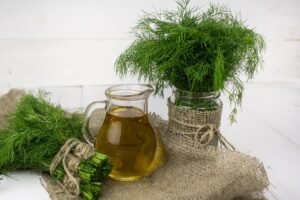All You Need to Know About Dill: A Culinary Herb with Hidden Health Benefits

Dill (Anethum graveolens), with its feathery green leaves and fresh aroma, is a versatile herb cherished in kitchens worldwide. Beyond its culinary appeal, dill is packed with nutrients and offers a range of health benefits. Whether you’re adding it to a dish or using it for its medicinal properties, dill deserves a place in your pantry and garden.
What is Dill?
Dill is an annual herb native to the Mediterranean and southern Russia. Its delicate leaves, often called dill weed, and its seeds are both used in cooking and natural remedies. With a bright, slightly tangy flavor, dill is a staple in many cuisines, especially Mediterranean, Scandinavian, and Eastern European.
Culinary Uses of Dill
Dill’s distinct flavor makes it a star in a variety of dishes. Here’s how it shines in the kitchen:
- Dill Weed: Fresh or dried dill leaves are used to flavor soups, salads, seafood, and sauces like tzatziki.
- Dill Seeds: A staple in pickling, dill seeds are also used in breads, spice blends, and stews.
- Dill Oil: Extracted from the seeds, it’s used to flavor candies and beverages.
Some popular dishes featuring dill include:
- Pickles: Dill pickles owe their signature taste to this herb.
- Gravlax: A Scandinavian dish of cured salmon, often seasoned with dill.
- Potato Salads: Fresh dill adds a burst of flavor to creamy potato dishes.
Nutritional Value of Dill
Dill is more than a flavor enhancer—it’s a nutrient-dense herb packed with:
- Vitamins: A, C, and several B vitamins.
- Minerals: Calcium, magnesium, iron, and potassium.
- Antioxidants: Polyphenols and flavonoids that combat oxidative stress.
Health Benefits of Dill
For centuries, dill has been used in traditional medicine. Here are some of its key health benefits:
- Aids Digestion
Dill helps soothe the stomach and reduce bloating, gas, and indigestion. Its essential oils stimulate digestive enzymes, improving gut health. - Promotes Heart Health
Rich in antioxidants and potassium, dill supports heart health by reducing blood pressure and cholesterol levels. - Boosts Immunity
The high vitamin C content in dill strengthens the immune system, helping to fight infections. - Supports Bone Health
Dill contains calcium and magnesium, which are crucial for maintaining strong and healthy bones. - Regulates Blood Sugar
Research suggests that dill may help stabilize blood sugar levels, making it beneficial for individuals with diabetes. - Freshens Breath
Chewing on dill seeds is a natural way to combat bad breath and promote oral hygiene.
How to Use Dill
Dill is a versatile herb that’s easy to incorporate into your diet. Here’s how to use it:
- Fresh Dill: Chop finely and sprinkle over salads, fish, or soups for a burst of freshness.
- Dried Dill: Use it as a seasoning in marinades, dips, and dressings.
- Dill Seeds: Add to bread dough, pickle brines, or roasted vegetables for a subtle, earthy flavor.
- Infused Water: Add dill sprigs to water with lemon for a refreshing detox drink.
Growing Dill at Home
Dill is easy to grow and thrives in sunny locations with well-drained soil. Sow seeds directly into the ground, and within weeks, you’ll have a lush herb garden. Harvest the leaves before the plant flowers for the best flavor.
Precautions and Side Effects
Dill is generally safe, but consider these points:
- Allergies: Rare but possible; avoid if allergic to plants in the carrot family.
- Medication Interactions: Dill may lower blood sugar, so consult a doctor if you’re on diabetes medication.
Fun Facts About Dill
- The word “dill” comes from the Old Norse word dylla, meaning “to soothe,” referring to its calming properties.
- Ancient Egyptians used dill as a remedy for headaches and digestive issues.
- Dill flowers attract beneficial insects like bees, making it a great companion plant in gardens.
Final Thoughts
Dill is a remarkable herb that adds a fresh, tangy flavor to dishes while delivering a host of health benefits. Whether you’re seasoning a dish, brewing a tea, or growing it in your garden, dill is a herb worth embracing.
Do you love dill? Share your favorite recipes and tips in the comments below!

Comments